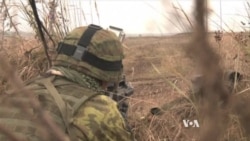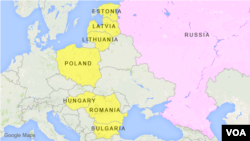The White House says a U.S. plan to deploy forces in eastern Europe and the Baltics is still in its early planning stages, and says it is part of a decades-old NATO mandate to protect European allies.
White House spokesman Josh Earnest spoke Monday, in the Obama administration's first public comments on the deployment plan since it was first reported Saturday in the New York Times.
"We signed a NATO treaty that provides for the defense of our allies and that is a treaty that the United States and this president is serious about upholding," Earnest told reporters at the daily White House briefing.
He said the plan is "still in the early stages of the policy making process, but is consistent with strategy that we have previously pursued."
Also Monday, Russia's foreign ministry warned against implementing the plan. "We hope that reason will prevail and the situation in Europe will be prevented from sliding into a new military confrontation which may have dangerous consequences," the ministry said in a statement.
Earlier Monday, Russia's Interfax news agency quoted senior Russian defense ministry official General Yuri Yakubov as saying that the plan, if put into action, would be “the most aggressive step by the Pentagon and NATO since the Cold War of the last century,” and that Russia would have no alternative other than to “build up its forces and means in the western strategic direction.”
Pentagon spokesman Colonel Steve Warren said Monday the plan to preposition heavy equipment, weapons to Eastern Europe is "something we've been doing" for training purposes. He said the Defense Department is still reviewing locations. When asked about Russian comments, he said "this is purely positioning of equipment to better facilitate our ability to conduct training."
On Saturday, the New York Times reported that if the plan is approved by U.S. Defense Secretary Ash Carter and President Barack Obama, the U.S. will store fighting vehicles and position as many as 5,000 troops in Bulgaria, Estonia, Latvia, Lithuania, Romania, Poland and possibly Hungary.
All seven countries are NATO members.
The Polish defense ministry said the plan would call for the U.S. to deploy battle tanks and other equipment in Poland. Defense Minister Tomasz Siemoniak said Sunday he discussed the plan with U.S. military officials in Washington last month and was assured a decision would be made soon.
Yakubov told Interfax that Russia would respond to such deployments by adding new tank, artillery and air units. The Russian military official also said that a missile brigade currently deployed in Kaliningrad, the Russian enclave that sits between Poland and Lithuania, would be more quickly outfitted with state-of-the art Iskander missile systems.
He added that the Russian military group deployed in Belarus would undergo “significant changes.”
Part of NATO ‘Spearhead’ forces
The plan to preposition weaponry and troops in Eastern Europe would be the first time the U.S. has embarked on such a military presence in the region since the end of the Cold War. It is part of the NATO military alliance's plan to develop rapid deployment "Spearhead" forces to deter any further Russian intervention beyond its annexation last year of Ukraine's Crimean peninsula and a signal that the U.S. would come to the defense of its NATO allies in Eastern Europe.
The U.S. consideration of the military buildup is also a response to the West's contention that Moscow is continuing to support pro-Russian insurgents fighting Kyiv's forces for control of eastern Ukraine, an argument Russian President Vladimir Putin rejects.
"If something happens, we can't wait days or weeks for more equipment," Raimonds Vejonis, Latvia's minister of defense told The New York Times, which first disclosed consideration of the buildup. "We need to react immediately."
Meanwhile, Russia's foreign ministry said that Foreign Minister Sergei Lavrov and U.S. Secretary of State John Kerry spoke by telephone on Monday.
The ministry said in a statement that the two officials reaffirmed that the parties to the cease-fire agreement for eastern Ukraine signed last February should fulfill all of its provisions and that "additional efforts" should be taken to prevent cease-fire violations.
Lavrov and Kerry also discussed the conflicts in Syria, Yemen and Libya, as well as negotiations over a final agreement on Iran's nuclear program, the ministry said.
VOA Pentagon correspondent Jeff Seldin and VOA White House correspondent Aru Pande contributed to this report.






